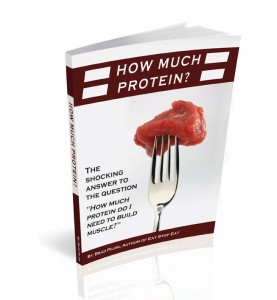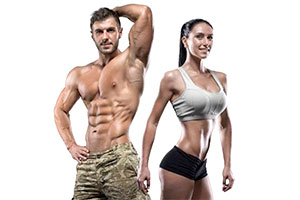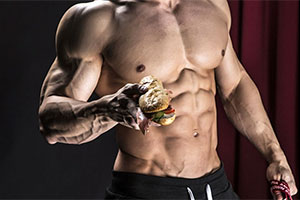With some recent editions to the already impressive amount of studies on protein and muscle building I thought it was time to reiterate my views on the big P and muscle building.
In the later part of 2013 we saw a review by Schoenfeld BJ, Aragon AA, Krieger JW that attempted to review the body of research on protein meal timing and muscle growth. In this review it was concluded that protein timing didn’t matter as much as total daily protein intake – with a recommendation of a protein intake that is roughly double the RDA – about 100 grams per day.
Then in late December we saw the publication of another paper from Kevin Tipton’s research group showing that A 20-g dose of whey protein is sufficient for the maximal stimulation of postabsorptive rates of something called myofibrillar muscle protein synthesis (A marker of muscle growth) in rested and exercised muscle resistance-trained, young men.
Adding these two papers to what we know about protein and we come to the following suggestions:
1) Muscle Protein synthesis can be maximally stimulated…
2) It takes 20-40 grams of protein to reach this maximal level of stimulation (depending on the protein source)
3) Once stimulated it takes about 4-6 hours for a muscle to be ready to be stimulated by amino acids again.
4) Weight training is what sensitizes a muscle group to the anabolic affects of protein…
5) This sensitization caused by a weight training session lasts anywhere from 48-72 hours.
While the verdict is still out on protein timing (whether or not you need to eat protein immediately after your workout) the fact remains that it doesn’t seem as if this is a BAD time to eat protein. So for arguments sake, let’s include it as a time that you could eat protein if you wanted to…
Putting it all together and you get:
Weight train, then consumer 20-40 grams of protein (depending on the protein source) every 4-5 hours to maximally stimulate protein synthesis in the muscle groups that were sensitized by the weight training program, attempt to simulate a muscle group with weight training every 48-86 hours.
Following this advice you would try to train a muscle group every 3-4 days, try to have 3 to 5 protein servings a day totaling 20 to 40 grams with each serving, reaching a daily total of somewhere around 100 grams of protein per day (again depending on your chosen protein sources).
Keep in mind these are recommendations for MUSCLE GROWTH, and people who are following insanely restrictive diets may benefit from more protein, but that’s a whole other story…
The important thing is if you follow these guidelines, it really does seem as if most people should be able to meet the protein requirements of muscle growth. Whether you are into Intermittent Fasting, 2 meals a day, 8 meals a day or breakfast, lunch, dinner and a snack just about any program can be used to aid in the muscle building process. In fact, as Geoff Howard of Mutant Nutrition points out, with a little planning, even a vegan should be able to build muscle by planning their meals properly…
Vegan Diet for Body Builders – Geoff Howard
Being a bodybuilder and getting in shape takes a tremendous amount of dedication. It also requires a lot of hard work physically as well as eating a proper diet that not only gives the necessary vitamins and nutrients a body needs, but also helps in building those all-important muscles. For the average body builder, to help aid in their body building goals they consume a lot of protein in the form of meat and eggs. The question becomes, if you are a vegan and a body builder, what is the best way to go about getting the proper amount of protein that you need in order to have the strength and muscle growth that you want to achieve.
Is it even possible for vegans to get the required protein in their diet without taking a bunch of supplements in order to replace the meat that is not eat? The answer to both questions is simple; vegans have learned the key to eating all the foods they need and getting their protein without consuming any animal products.
Living a Vegan Lifestyle
For vegans there is a misconception that they are missing out on things by not eating animal products. The truth is vegans have very happy and healthy lifestyles based on their beliefs. Vegans have learned to steer away from the traditional ways of eating, which involve animal products, and getting the nutrients, they need eating a healthier diet. Not eating meat does not mean that a vegan is going to deprive himself or herself of important protein sources. Vegans have learned that it is possible to get the essential eight amino acids necessary from eating a combination of plant foods, or alone.
Protein Sources for Vegans
Vegans have a diet filled with a variety of plant based foods that provide them with the necessary vitamins, minerals, and nutrients they need, and this includes all of the amino acids found in meat. Here is a list of the foods that vegans eat that provides them with the essential amino acids.
x Grains – Oats (Which includes cereals, granola, oatmeal), brown rice, corn, barley, wheat (including whole grain pasta, flour, bread, and cereals), millet, and bulgar
x Greens – Spinach, collard greens, broccoli, and similar vegetables
x Seeds and Nuts – Sesame seeds, sunflower seeds, pumpkin seeds, along with other seeds and the butter created from ground sesame seeds. Walnuts, cashews, almonds, pecans, pistachios, filberts, macadamias, along with the butters made from these nuts.
x Legumes – Chickpeas, lentils, green peas, alfalfa sprouts, peanuts, beans (Lima, navy, kidney, aduki, and soybeans to name a few) and food products created from them, such as tofu and soy milk.
All of the above listed foods are staples in the healthy diet of a vegan. Through the consumption of these foods, either alone or in combinations with one another, a vegan is able to get all of the essential nutrients that they need. Furthermore, by eating these various foods, body builders that happen to be vegans do not have to lack the necessary benefits that eating protein provides them in their fitness regime. A well-informed body builder, who also happens to be a vegan, can easily create a diet plan filled with the healthy foods that they need and not deprive themselves of the eight essential amino acids they need for not only a healthy work out, but also a healthy life.
–
Geoff Howard owns Mutant Nutrition. Prior to founding Mutant Nutrition, Geoff was a highly sought after personal trainer. He is an expert in health and fitness and shares his knowledge on variety of websites.









